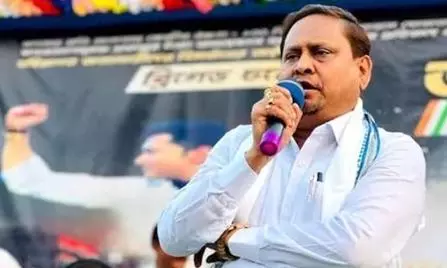
What have Muslims gained by supporting the TMC? As a TMC representative, what answer do I give to the people of my constituency? Murshidabad strongman tells The Federal
Bengal: Rebel TMC MLA to float new party amid discontent over new OBC policy
Murshidabad strongman to launch outfit on Dec 22; plans 'Babri Masjid' replica foundation on Dec 6 to tap into minority resentment against TMC

Alongside the Indian Secular Front (ISF), led by Islamic cleric Abbas Siddiqui, and Asaduddin Owaisi’s All India Majlis-e-Ittehadul Muslimeen (AIMIM), a new challenger has emerged from within the Trinamool Congress itself , threatening to erode the Mamata Banerjee-led party's traditional Muslim vote base.
Ahead of the 2026 state assembly elections, in a significant development, TMC MLA and Murshidabad strongman Humayun Kabir is all set to float a new political party, with an intention to contest around 50 seats across West Bengal.
Discontent over new OBC policy
The timing of the development is significant, coming amid an undercurrent of discontent among Muslim groups over the new OBC policy introduced by the TMC government in June this year.
A few thousand Muslim youths recently took out a protest march in Murshidabad, denouncing the new OBC policy that reclassified several Muslim sub-communities from the “OBC-A” (more backward) to the “OBC-B” (less backward) category, while removing some from the list altogether.
Humanyun Kabir appears keen to tap into the prevailing discontent.
Also read: EC team to review Bengal poll readiness amid tensions with Mamata govt
Talking to The Federal, “The new OBC policy is a complete letdown. The government is trying to woo communities that traditionally vote for the BJP by upgrading them to the OBC-A category, and adding a few new groups to the list. But what have Muslims gained by supporting the TMC? As a TMC representative, what answer do I give to the people of my constituency?”
The revised OBC list includes 140 sub-groups with 80 Muslim and 60 non-Muslim communities. While Muslims account for roughly 57 per cent of the total, the distribution across categories has drawn criticism from the Muslim groups.
In the more disadvantaged “OBC-A” category, which comprises 49 sub-groups, 36 are Muslim, representing about 73 per cent, while in the “OBC-B” category of 91 sub-groups, 44 are Muslim, which works out to be roughly 48 per cent. Despite these numbers, many Muslim groups argue that a significant number of previously listed Muslim sub-communities have been downgraded or dropped entirely from OBC-A and moved to OBC-B or left unrecognised, effectively reducing their entitlement to reservations.
They point out that thirty-seven Muslim groups were removed altogether from the lists, while many others were shifted from the higher-reservation OBC-A category to OBC-B.
Since OBC-A is allocated a higher reservation of 10 per cent compared to 7 per cent for OBC-B, the reassignment or removal of communities has direct implications for their access to educational and employment opportunities.
New Babri Masjid
The new outfit would be launched on December 22, Kabir said. Prior to floating the party, Kabir said, he would lay the foundation stone for a grand “Babri Masjid” at Beldanga in Murshidabad on December 6, the day the original Babri mosque in Ayodhya, Uttar Pradesh, was demolished by kar sevaks in 1992.
He said the proposed mosque at Beldanga would be an exact replica of the demolished Ayodhya structure and would take at least three years to complete.
Also read: Ahead of elections, BJP taps football and cinema to boost party prospects
Beldanga, which has witnessed several incidents of communal tension and violence in recent years, is already viewed as a potential flashpoint in the state.
The construction of such a symbolic mosque there has the potential to further heighten communal sensitivities in the area. “If Humayun forms a new party, TMC will lose in 22 assembly seats in Murshidabad,” claimed BJP leader Suvendu Adhikari.
Incidentally, it was Adhikari who was instrumental in bringing Kabir to the TMC. Kabir was once a close associate of Congress leader Adhir Ranjan Chowdhury, but switched to the TMC in 2013. Adhikari, who was at the time one of Mamata Banerjee’s trusted lieutenants, played a key role in facilitating Kabir’s shift from the Congress, TMC sources said.
Eyeing minority vote bank
Kabir is not the only one aiming to dent the TMC’s hold on the minority vote bank.
The ISF, established ahead of the 2021 Assembly elections under the influence of the Furfura Sharif shrine, has steadily expanded its presence, particularly in several minority-dominated pockets of south Bengal.
In the 2023 three-tier panchayat elections, the party secured 336 seats, including 325 gram panchayats, 10 panchayat samitis, and one zila parishad, primarily in districts such as North and South 24 Parganas, Howrah, Malda, Murshidabad, and Hooghly.
Its support base is largely concentrated among Bengali-speaking Muslims, a community that accounts for over half of the state’s roughly 30 per cent Muslim population.
The AIMIM, which has so far maintained a limited presence in the state, launched a statewide membership drive. According to AIMIM spokesperson Imran Solanki, the party intends to contest all seats in next year’s assembly elections “with full force.”
Sources said the party approached Kabir for a potential alliance in the minority-dominated districts of Murshidabad and Malda.
“I am open to alliances with any non-TMC party that will safeguard minority rights and strongly oppose the BJP. However, it would not be appropriate for me to disclose which parties have approached me,” Kabir stated.

